Foreign direct investment (FDI) has become a crucial driver of economic development in various regions worldwide, particularly in Sub-Saharan Africa. As countries in this region strive for economic growth, understanding the dynamics between FDI, institutional structures, and overall economic performance is critical. A recent study conducted by Okwu, Adelowokan, and Osisanwo delves deep into the intricate relationships between these elements, providing insightful analysis pertinent to policymakers, researchers, and investors alike.
In their paper, titled “Foreign direct investments, institutional structure and economic growth in Sub-Saharan Africa,” published in the journal Discover Sustainability, the authors highlight the significant role that foreign direct investment plays in enhancing economic growth trajectories throughout Sub-Saharan Africa. They discuss how FDI inflows can lead to technological advancements, skills transfer, and overall productivity improvements within recipient countries. This is especially relevant in Sub-Saharan Africa, where economic systems often struggle with underinvestment in infrastructure and human capital.
One of the notable aspects of the research is the identification of institutional structures as critical mediators in the FDI-growth nexus. Institutions—comprising legal frameworks, policy environments, and governance systems—can either facilitate or hinder foreign capital inflows into developing economies. The authors’ analysis suggests that countries with robust institutions tend to attract more FDI and, consequently, experience enhanced economic growth. This correlation underscores the need for Sub-Saharan African nations to strengthen their institutional frameworks to maximize the benefits of foreign investments.
Moreover, the paper emphasizes the importance of political stability in fostering a conducive environment for foreign investments. Political instability can lead to uncertainties that deter foreign investors, who seek stable and predictable environments for their capital. The researchers pointed out that Sub-Saharan countries exhibiting solid democratic practices and transparent governance tend to outperform their peers in attracting FDI. In this context, effective governance serves as a backbone for sustainable economic development.
The authors conducted extensive empirical analyses drawing on various data sets that document FDI flows, economic indicators, and institutional quality across multiple Sub-Saharan African nations. Their findings reveal a nuanced perspective: while FDI does contribute positively to economic growth, its effectiveness is significantly amplified in contexts where governance and institutional structures are sound. This insight elevates the discourse around FDI from a simple quantitative assessment to a more qualitative understanding of its interaction with varying contexts and institutional frameworks.
Interestingly, the paper also touches upon the sectorial distribution of FDI within Sub-Saharan Africa. The research reveals that sectors such as telecommunications, mining, and agriculture receive the majority of foreign investment. Notably, these sectors hold transformative potential for local economies but also come with unique challenges related to environmental sustainability and social impacts. Therefore, the proactive engagement of local governments in crafting policies that foster sustainable practices within these sectors emerges as a key takeaway from the study.
The impact of FDI on job creation is another salient point discussed in the paper. The authors argue that foreign companies often bring in advanced technologies and methodologies, which can significantly enhance productivity levels. However, they also caution that the job opportunities created by foreign investments may not always align with the skill sets of the local workforce. This mismatch can lead to underemployment or even an increase in informal sector activities. Hence, the need for educational reforms that align training with market needs becomes paramount.
The research further highlights challenges associated with the repatriation of profits generated by foreign investments. While foreign investors often play a pivotal role in economic development, the potential outflow of profits can strain local economies. This concern calls for the implementation of policies aimed at reinvesting a greater share of foreign earnings into local initiatives, ensuring that the benefits of FDI are more equitably shared with the local populace.
The socio-economic implications of FDI cannot be overstated. The findings of the study suggest that while FDI can bolster economic growth, it can also exacerbate existing inequalities if not carefully managed. Countries in Sub-Saharan Africa must prioritize inclusive growth strategies that consider the welfare of all citizens, especially marginalized groups who often bear the brunt of economic disparities. The authors advocate for government initiatives that promote equitable access to resources and opportunities, facilitating a more balanced distribution of the gains derived from FDI.
In conclusion, Okwu, Adelowokan, and Osisanwo provide a comprehensive examination of the interplay between foreign direct investments, institutional frameworks, and economic growth in Sub-Saharan Africa. Their findings advocate for an integrated approach where strengthening institutions and governance, coupled with strategic economic policies, can enhance the potential of foreign investments. As countries in the region seek to navigate the complexities of globalization and economic development, the insights from this research serve as a vital guide to harnessing the power of FDI for sustainable and equitable growth.
The authors express hope that their research will catalyze further conversation and action in both academic and policy-oriented circles. By underscoring the intricate dynamics of FDI in the context of institutional quality, the study paves the way for developing comprehensive strategies that respond to the unique challenges and opportunities present in Sub-Saharan Africa.
Ultimately, this research serves as a clarion call for countries within this region to actively invest in their institutional frameworks. By doing so, they can create more favorable conditions for foreign direct investment, leading to enhanced economic performance and a brighter future for their citizens.
Subject of Research: Foreign direct investments and their impact on economic growth in Sub-Saharan Africa.
Article Title: Foreign direct investments, institutional structure and economic growth in Sub-Saharan Africa.
Article References:
Okwu, A.T., Adelowokan, O.A. & Osisanwo, B.G. Foreign direct investments, institutional structure and economic growth in Sub-Saharan Africa.
Discov Sustain 6, 1145 (2025). https://doi.org/10.1007/s43621-025-01761-1
Image Credits: AI Generated
DOI: 10.1007/s43621-025-01761-1
Keywords: Foreign Direct Investment, Economic Growth, Sub-Saharan Africa, Institutional Quality, Governance, Economic Policies.




